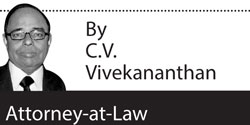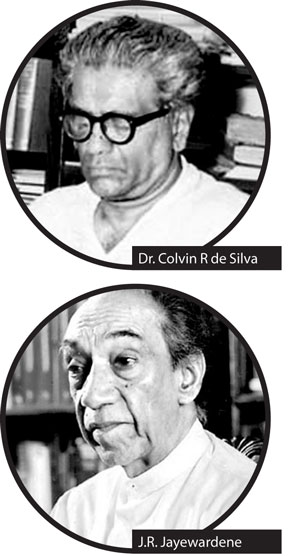Reply To:
Name - Reply Comment
Last Updated : 2024-04-19 22:36:00
 It is an indelible fact that the lack of political will combined with fundamentally flawed Provisions of the 1972 and 1978 Constitutions and the mind – set framework of the majority community to share power with the Tamils stifled the Devolution Process.
It is an indelible fact that the lack of political will combined with fundamentally flawed Provisions of the 1972 and 1978 Constitutions and the mind – set framework of the majority community to share power with the Tamils stifled the Devolution Process.
1972 Constitution
The Political Analysts are of the view that both 1972 and 1978 Constitutions have adumbrated with the Principle of ‘Constitutional autochthony’.
The principle of ‘autochthony’ was first asserted by the Irish Court in 1922 when they aspired to get free from the United Kingdom, proclaiming the Irish Free State Legislature as a Constituent Assembly.
Instead of adopting a home-grown Constitution, the Irish Government adopted the Independence Act enacted by the UK, granting Independence to Ireland.

The new Constitution of Ireland was approved but not passed as an Act by the Irish Parliament. Besides, Ireland passed her Constitution while she was a Member of the Commonwealth. So, “Autochthonous Roots” were abandoned by Ireland.
Thus, the Principle of Autochthony has become a myth. In the 21st century no country could proudly claim to be Autochthonous.
The 1972 Constitution would demonstrate that many of the Institutions of UK that had evolved through Constitutional conventions, customs and practices were embodied in the Constitution. There is no homegrown concept adopted in the 1972 Constitution. Dr. Colvin R de Silva had prophetically declared in Parliament in 1956 on the Sinhala Only Bill that “One Language Two Nations: Two Languages one Nation”.
Political irony was that he was the Chief Architect to draft 1972 home grown Constitution, bringing the Sinhala Only Act bodily onto the 1972 Constitution. Article 7 explicitly states “the Official Language of Sri Lanka shall be Sinhala as provided by the Official Language Act No. 33 of 1956”.
Dr. Colvin R. de Silva defended his Constitution at the Meeting held at Margi Institute on 20th November 1986. He said that a remark was made by “no less a personality than Mr. Velupillai Prabhakaran of the LTTE”. He further said that “Prabhakaran has reported to have said that what caused him to take up arms was the 1972 Constitution which according to him took away even the few rights they had”.Events had later proved that 1972 Constitution was the major land mark to lead the Country into a Nation of Disintegration.
No clear cut division of power sharing between the Central Government and the Provincial Councils.
Subjects under Concurrent List came under complete control of Parliament.
The National Policy under the Reserved List undermined all powers devolved or delegated to the Provincial Councils.
Nationalism, projected by the Constitution, was the Sinhala Nationalism and enforced Sinhala Majoritarianism.
The 1972 Constitution failed to create the needs of a plural society and failed to promote national consciousness but, created communal tension.The Senate that gave certain degree of protection to the minority interests was abolished.
Judicial Services Commission was replaced by an Advisory Board and Disciplinary Board, which lacked the efficacy of Powers and Independence.
Article 5 of the 1972 Constitution declared that “The National State Assembly controlled and concentrated within itself legislative, executive and Judicial Power of the People. No Institution was allowed to thwart the Will of the Members of the National State Assembly.
All the Safeguards that were provided by Article 29 and its Sub-Articles of the Soulbury Constitution were eroded.
Thus the 1972 Constitution failed to bring an effective re-conciliation among all communities of Sri Lanka.
1978 Constitution
J.R. Jayewardene proclaimed that the 1978 Constitution would ‘create and preserve a Just and Free Society as the intangible heritage that guarantees the dignity and well being of succeeding generations of the People of Sri Lanka.
The 1978 Constitution is based on the principle of Government of USA, France and Britain Models of Parliamentary Democracy with the insertion of certain home grown theories of Government.
However, an unbiased study of the 1978 Constitution would clearly show that it lacked very much of the homegrown roots.
Unlike the 1972 Constitution, 1978 Constitution was said to be creative with illuminating ideas in the field of several governmental activities but it ultimately ended in authoritarianism and pushed the country into deep political mire.
The 1972 Constitution failed to create the needs of a plural society and failed to promote national consciousness but, created communal tension
Public Service was made independent in name but its working mechanism was practically made dependent for its powers on Cabinet Delegation.
The powers that were given by the left hand to 13th Amendment and the Provincial Councils were taken away by the right hand.
It was made so easy to re-take powers delegated to certain fields even by ministerial and/ or administrative directions. Project Minister, Urban Development Authority, Road Development Authority had by their own activities made a quick evaporation of the Powers of the Provincial Council.
There was no clear-cut division of power-sharing between the Central Government and the Provincial Councils.
The subjects that were specified under Concurrent List came under the complete control of Parliament.
The National Policy under the Reserved List undermined all powers devolved or delegated to the Provincial Councils.
The Bill introduced by the National Ministry of Transport and Highways on 23.07.1991 declares in the Preamble of the Bill that “whereas it is National Policy of the Government…….”. The Central Government made several inroads into the powers of the Provincial Councils and castrated by National Policy.
Whenever two languages or more become Official Languages, it is declared that in the event of inconsistency, the correct text shall prevail. Both Sinhala and Tamil are the Official Texts. 16th Amendment makes Sinhala Text to prevail in the event of inconsistency between the two texts, without stating the correct Text to prevail, thus installing supremacy to Sinhala Only.
Article 24(2) and (3) of 1978 Constitution permit a Party or Lawyers to initiate proceedings in Court throughout the Island in either Sinhala or Tamil and make them entitled to Interpretation and Translation into the appropriate National Language provided by the State but Article 24(1) (b) of the 1978 Constitution bestows special power to the parties, Judges Lawyers to ask to maintain in the Northern and Eastern Provinces proceedings in the Sinhala Language also.
Both President and the Prime Minister are working with pain to see all communities are bestowed with their respective rights fully enshrined.
Fervent hope is dawning in the mind of TNA and Opposition Leader R. Sampanthan that the President would overcome all opposition and accommodate the legitimate political aspirations of the Tamils in the Proposed New Constitution.
He thinks that, despondency and political frustration should not be allowed to overtake optimism.
It is a fact that President has the necessary and required patience, conviction and courage to make Sri Lanka a beautiful home to all communities as Rudyard Kipling envisaged in his illuminating poem:
“If you can trust yourself when all men doubt you
If you can wait and not be tired of waiting
Or being hated, don’t give way to hating.
If you can fill the unforgiving minute
With sixty seconds’ worth of distance run
Yours is the Earth and everything that’ is in it
And
Which is more,
You’ll be a Man”

Add comment
Comments will be edited (grammar, spelling and slang) and authorized at the discretion of Daily Mirror online. The website also has the right not to publish selected comments.
Reply To:
Name - Reply Comment
On March 26, a couple arriving from Thailand was arrested with 88 live animal
According to villagers from Naula-Moragolla out of 105 families 80 can afford
Is the situation in Sri Lanka so grim that locals harbour hope that they coul
A recent post on social media revealed that three purple-faced langurs near t